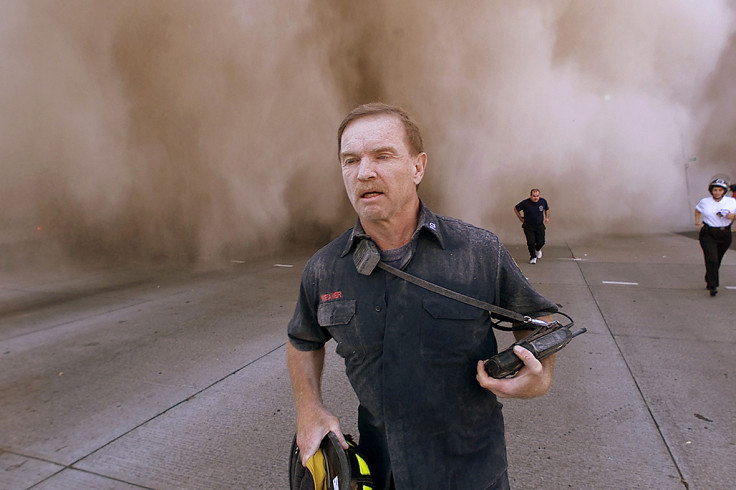Remembering 9/11: Why modern America's darkest day remains 'a wound that will not heal'
The US has fought two wars and killed Osama Bin Laden but al-Qaeda's 2001 atrocity looms large.
NCIS Special Agent Robert McFadden was at work in Sana'a, Yemen, when United Airlines Flight 175 smashed into the south tower of the World Trade Centre on September 11, 2001. American Airlines Flight 11 had hit the north tower 17 minutes earlier and the FBI team watched, stunned, as the second plane hit its mark.
"We looked at each other and thought: oh shit, that's got to be something really bad because there's no flight path that goes through lower Manhattan like that. We know the city and we knew that aircraft do not fly in that area," he said.
McFadden was part of a small team investigating the October 2000 attack on the USS Cole, which had killed 17 US servicemen. They had spent weeks interrogating al-Qaeda suspects linked to the attack and had been frustrated by the Yemeni authorities denying them access to major players. But immediately after 9/11, all that changed.
"We had access right away to some really hard-bitten, pipe-hitting al-Qaeda members," he said. "It was very productive."
McFadden would spend many hours sat opposite senior members of al-Qaeda – linked to both 9/11 and the USS Cole bombing over the next decade – interrogating high-profile terrorist suspects that had been involved in both attacks. He is now based in the US but is often called to testify in active proceedings.
As a result, 9/11 stills looms large in his life. "I think about it quite a bit. I have had the opportunity to interrogate individuals who were intimately involved in in 9/11. In fact, one of the original high value detainees who is awaiting trial for 9/11. So I have followed the proceedings – or lack thereof – intently, on a daily basis," he said.

But aside from the death of Osama Bin Laden in 2011, there has been little closure for America since the death of 2,799 civilians in the attacks on 9/11. Zacarias Moussaoui was sentenced to six consecutive life sentences for his role in planning the atrocity but Khaled Sheikh Mohammed – described as the architect of 9/11 – remains embroiled in a complex and at times chaotic military tribunal 12 years after his capture in Pakistan.
Meanwhile even those who may have backed the conflicts in Iraq and Afghanistan would struggle to argue that the US-led interventions have made America – or the world – any safer. Al-Qaeda's influence may have faded in the years since 9/11, but Islamic State (Isis) have stepped into the void, bringing murder and bloodshed to the streets of Paris, Brussels, Beirut, Kabul, Qatif and Baghdad in the last 12 months alone.
America too changed in the years immediately following September 11. In the days and weeks after 9/11, over 1,200 people – most of them Muslims – were rounded up by the police and the immigration authorities, including Iranian nationals and at least 70 Israelis. Many were detained for several weeks in maximum security prisons and only released after paying tens of thousands of dollar bonds to the INS (Immigration and Naturalization Service).
Yemeni Ali al-Maqtari, now a university professor in Connecticut, spent 12 weeks in maximum security prisons after two pairs of box-cutters were found in his car. His wife, a US-born Muslim convert, eventually had to resign from her position in the US Army. It took Maqtari until 2007 for his marriage to be accepted by the US immigration department and for him to be given citizenship.
Then in January 2002, the US set up Guantanamo Bay detention centre in Cuba, which would quickly become home to 779 prisoners seized during operations in Afghanistan and Iraq – as well as elsewhere. Most of the detained there were held without charge and only released after several years of protracted international negotiations and legal battles. President Barack Obama has pledged to close Guantanamo before he leaves office.
McFadden said he was part of a "modest but vocal" camp of practitioners who opposed both the setting up of Guantanamo and the trying to terrorist suspects in military commissions rather than through US federal courts. As for the mass arrests that followed 9/11, McFadden said that while they were the result of US law enforcement being put on what was effectively a 'war footing', he hope that lessons had been learned from what took place.
"I've always preached about guarding against a monolith [...]. But particularly around historic tragic events there tends to be the making of a monolith that doesn't exist and all those people that have similar physical features and even a religion – although vastly different in their belief system – are all swept into one huge pot. I hope we learned from that," he said.
But as with the USS Cole, the architects of which have still not been convicted of their role in the attacks, so it is difficult for the US to have closure over 9/11: "I think we will see that on the anniversary on the 11<sup>th. It is still a wound that will take a long time to heal and will continue have an impact on our policies, our security and in some ways our way of life," he said.
© Copyright IBTimes 2024. All rights reserved.






